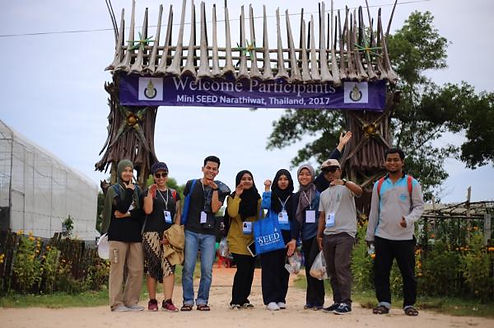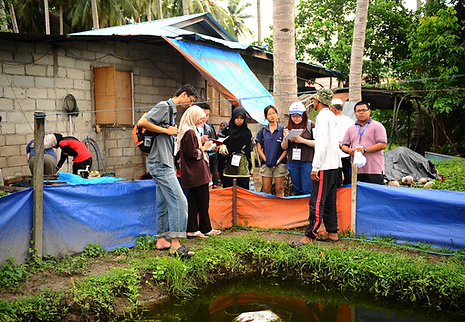SOCIAL ENTERPRISE FOR ECONOMIC DEVELOPMENT [SEED]
Introduction and Overview
The Social Enterprise for Economic Development (SEED) Program of the ASEAN Learning Network is a unique students’ centred and socially responsible learning initiative, requiring students to work together in international and multicultural teams to learn experientially in the real-life context of a poor Southeast Asian village. It was conceived by Professor CHONG Li Choy, of the Asia Research Centre at the University of St Gallen, and is being co-developed with collaborators of the ASEAN Learning Network from different Southeast Asian universities. The first SEED program was implemented in 2007 in collaboration with faculty members and students of the School of Business Management at the Bandung Institute of Technology (where Prof. Chong was a visiting professor), to help students gain needed competencies in intercultural management in Asia. Today, the program has evolved into an effective inter-cultural transformational leadership and entrepreneurship development program. Variants of this program has also been introduced or are being developed by different partner universities of the ASEAN Learning Network to develop students in other subject areas, such as to improve the spoken language skills of students, to increase the social awareness and to imbibe ethical and social responsibility values in law students, to rehabilitate displaced people (such as the Temiars in Malaysia who lost their jungle habitat due to the clearing of jungle areas for economic development), or to help in the development of livelihoods of villagers at Pulau Teluk Renjuna in Kelantan.
The vision of ASEAN Learning Network is to attain practice-relevant academic excellence in a socially responsible way for participating institutions through context-based management and economic research, teaching and practice-training. Its mission is to develop and implement context-based research, teaching and practice-training projects and programs in collaboration with participating institutions to produce students who are socially responsible and culturally competent in the evolving context of Asia. To fulfil our vision and mission, the activities of the ALN involving members include: Research and training seminars (including Research Collaborations), teaching in regular but pertinent courses of partner universities and the SEED programs, and new program and curriculum development and initiatives to meet the needs of our partner universities in their respective contexts, including the development of the SEED program. The ALN is a network of people, who together with their academic institutions, seek to renew minds and change lives in order to bring about a better and more sustainable world, through socially responsible and responsive (management) education as a way of life (that is, in teaching and learning), through the development and selfless application of context-based (management) research, teaching and practice to help the less privileged people in the region to become effective problem solvers in their own contexts, in order to bring about better livelihoods, prosperity and well-being for them and their communities over time, and through empathy and learning to empathize with others in society (particularly the less privileged), to bring about social responsiveness which is responsible, peaceful and harmonious with the well-being of all legitimate stakeholders
In the SEED program, students learn and understand through practice by developing a viable enterprise plan with villagers which the villagers will themselves implement. By resolving the villagers’ problems arising from their perception of the viability of proposed ideas, students win the agreement and change the mind-sets of villagers through empathy and effective intercultural understanding and teamwork, thereby, acquiring skills in intercultural management, transformational leadership, entrepreneurship and innovation. Here, students are transported into a foreign socio-cultural context to carry out social research (social mapping of the village), to live among and interact with villagers to observe and obtain information, to understand their way of life (culture) and empathize with them, so that they can communicate and work effectively with them to achieve their assigned tasks (business plan development through effective communication and problem solving to overcome their mental blocks or reservations). In so doing, students allowed themselves to be transformed first in order to transform the villagers (transformational leadership through example and moral suasion).
The SEED program has been successfully implemented in Indonesia, Malaysia, Vietnam, the Philippines and Thailand. It was hailed as an “excellent example for more responsibility in business education” (by United Nations’ Head of PRME, Manuel Escudero), when presented at the first UN PRME Global Conference in 2008. The President of the Republic of Indonesia (Dr. Susilo Bambang Yudhoyono), who visited the first SEED village (a remote village in the mountains of Bandung at Cisandori) in 2010, praised the villagers for their “creative problem solving and enterprise”, which is the primary objective of the students’ work with villagers in developing the enterprise plan.


